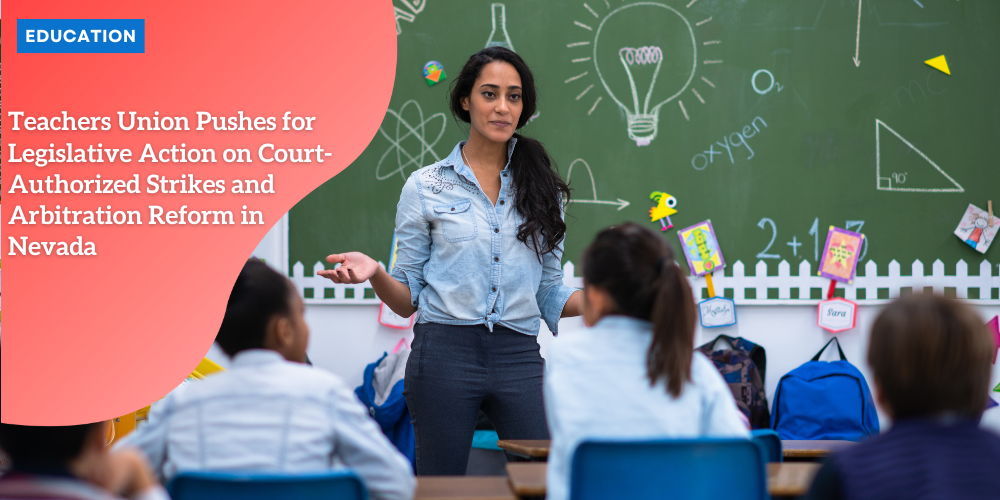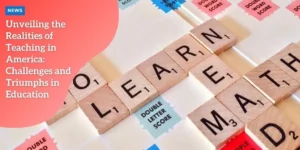Teachers Union Pushes for Legislative Action on Court-Authorized Strikes and Arbitration Reform in Nevada

Clark County Teachers Demand Reform to Speed Up Arbitration Process and Secure the Right to Strike Legally
Introduction
In an ongoing effort to enhance the bargaining power of educators, the Clark County teachers union is advocating for significant changes to Nevada’s labor laws.
Anúncios
The union is urging lawmakers to pass legislation that would expedite the arbitration process and grant teachers the right to strike legally under specific circumstances.
If this legislation fails to pass, the union plans to take its case directly to Nevada voters through an initiative that would appear on the 2026 General Election ballot.
Current Situation: Arbitration and Contract Negotiations
The Clark County Education Association (CCEA), representing around 18,000 teachers and licensed professionals within the Clark County School District (CCSD), has long faced challenges in reaching timely agreements on contracts with the district.
Anúncios
As the fifth largest school district in the United States, CCSD often finds itself in prolonged arbitration processes with the CCEA, which sometimes leaves teachers beginning the school year without a new contract in place.
This situation not only undermines morale but also contributes to poor teacher retention.
In recent years, these impasses have been particularly contentious, as teachers have been forced to operate under outdated agreements while awaiting new terms.
Anúncios
For instance, in 2023, despite what was labeled as a “historic” education budget approved by the Legislature and Governor Joe Lombardo, contract negotiations stalled, and teachers had to endure months of public disputes.
Eventually, a contract agreement was only reached in December, halfway through the school year.

The Proposed Legislation: Senate Bill 161
To address these recurring issues, the CCEA is backing Senate Bill 161, a piece of proposed legislation aimed at streamlining the arbitration process and providing teachers with a path to legally strike.
If passed, SB 161 would establish an expedited arbitration process for school districts and teachers unions, mandating that negotiations be concluded at least 75 days before the start of a new school year.
This would ensure that both parties have ample time to reach an agreement without unnecessary delays.
The bill would also allow K-12 public school teachers to petition district courts to authorize a strike under certain conditions.
Currently, strikes are illegal for public school teachers in Nevada, but SB 161 seeks to establish a clear and legally defined pathway for strikes under specific circumstances.
Conditions for Striking
According to State Senator Rochelle Nguyen, who is sponsoring the bill, the threshold for authorizing a strike would be intentionally high.
Teachers would need to demonstrate that a strike would be “equally or less detrimental” to students than continuing in schools that are struggling due to existing policies or conditions.
Notably, the proposed legislation explicitly excludes strikes from affecting critical services such as special education, food services, mental health counseling, and after-school supervision.
Nguyen has characterized the bill as a balanced approach that meets the spirit of Nevada’s existing anti-strike laws while addressing the ongoing issue of prolonged arbitration between CCSD and CCEA.
The proposed bill allows for a legal strike only after a thorough review process, ensuring that such a decision would be in the best interest of students and educators alike.
The Right-to-Strike Initiative: A Back-Up Plan
In the event that SB 161 fails to pass, the CCEA is prepared to pursue a more drastic measure: a ballot initiative that would grant teachers the right to strike.
This initiative, which is already scheduled for the 2026 General Election, would bypass the legislative process and present the issue directly to Nevada voters.
As Executive Director John Vellardita of CCEA explained, the union has the resources and support to run a successful campaign for the initiative.
He emphasized that the union has conducted field research, and its findings suggest widespread support for granting teachers the right to strike legally.
Opposition to the Bill
While the CCEA and its supporters argue that the legislation is necessary for improving working conditions and ensuring fair treatment of educators, the bill has sparked significant opposition.
Several groups, including the Nevada State Education Association (NSEA) and the Nevada Association of School Superintendents, have voiced concerns over the potential negative impact of legalized strikes on schools and communities.
Tom Clark, a lobbyist representing the Nevada Association of School Boards, expressed fears that teacher strikes would disrupt communities and cause widespread suffering.
He warned that such actions could result in tens of thousands of children being left without childcare and could garner national media attention for all the wrong reasons.
According to Clark, the threat of a strike would give teachers an unfair advantage in negotiations, creating an imbalance that would ultimately harm students, families, and the broader community.
The NSEA, which represents teachers in non-Clark counties and support staff in CCSD, also opposes the bill, arguing that it would give CCEA an unfair bargaining advantage over other groups.
This opposition is particularly strong due to the historical tensions between NSEA and CCEA, which often have conflicting interests in statewide labor discussions.
| Point of View | Supporters | Opponents |
|---|---|---|
| Bill Objective | Create a fairer and more efficient process for resolving disputes between teachers and school districts. | Could undermine the stability of the education system and create a volatile environment for both students and teachers. |
| Impact on Working Conditions | Better working conditions are expected, with early cooperation between the union and district. | Concern that the measure won’t address long-term issues and could create uncertainties. |
| Effect on the School Year | Could prevent delays at the start of the school year, promoting a more stable start for teachers and students. | Worry that delays and issues may still occur, affecting morale and stability. |
| Teacher Turnover | Could reduce turnover with better working conditions and fewer delays. | Turnover may not be significantly impacted given the history of failures in previous solutions. |
The Path Forward
The future of SB 161 remains uncertain as Nevada’s legislative session approaches its conclusion.
The bill has already passed its first hurdle in the Senate Committee on Government Affairs, where it was approved on a 5-2 vote.
However, it still faces significant opposition in the broader legislative process, and it remains to be seen whether it will gain enough support to pass through both chambers of the Legislature before the session ends on June 2.
If the bill does not pass, the CCEA is prepared to take its case directly to Nevada voters in 2026, with a right-to-strike initiative that could alter the legal landscape for teachers in the state.
While the outcome remains unclear, one thing is certain: the debate over teachers’ rights and the future of education in Nevada is far from over.
Conclusion
The ongoing struggle between teachers’ unions, school districts, and lawmakers in Nevada has highlighted the pressing need for reform in the arbitration process and the issue of teacher strikes.
Whether through legislative action or a public ballot initiative, the outcome of this debate will have significant implications for educators, students, and the broader community.
As the situation unfolds, all eyes will be on Nevada to see how lawmakers respond to the demands for change in the state’s education system.





